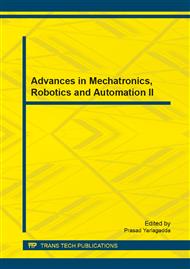[1]
A. Bagheri, T. Karimi, N. Amanifard: Tracking performance control of a cable communicated underwater vehicle using adaptive neural network controllers, Applied Soft Computing, Vol. 10 (2010), pp.908-918.
DOI: 10.1016/j.asoc.2009.10.008
Google Scholar
[2]
O. Mohareri, R. Dhaouadi, A. B. Rad: Indirect adaptive tracking control of a nonholonomic mobile robot via neural networks, Neurocomputing, Vol. 88 (2012), pp.54-66.
DOI: 10.1016/j.neucom.2011.06.035
Google Scholar
[3]
Y. Huang, D. Liu: Neural-network-based optimal tracking control scheme for a class of unknown discrete-time nonlinear systems using iterative ADP algorithm, Neurocomputing, Vol. 125 (2014), pp.46-56.
DOI: 10.1016/j.neucom.2012.07.047
Google Scholar
[4]
M. Fairbank, S. Li, X. Fu, E. Alonso: An adaptive recurrent neural-network controller using a stabilization matrix and predictive inputs to solve a tracking problem under, Neural Networks, Vol. 49 (2014), pp.74-86.
DOI: 10.1016/j.neunet.2013.09.010
Google Scholar
[5]
J. Peng, R. Dubay: Nonlinear inversion-based control with adaptive neural network compensation for uncertain MIMO systems, Expert Systems with Applications, Vol. 39 (2012), pp.8162-8171.
DOI: 10.1016/j.eswa.2012.01.151
Google Scholar
[6]
W. Chen, J. Li: Adaptive neural network tracking control for a class of unknown nonlinear time-delay systems, Journal of Systems Engineering and Electronics, Vol. 17 (2006), pp.611-618.
DOI: 10.1016/s1004-4132(06)60105-9
Google Scholar
[7]
H. M. Yen, T. H. S. Li, Y. C. Chang: Adaptive neural network based tracking control for electrically driven flexible-joint robots without velocity measurements, Computers & Mathematics with Applications, Vol. 64 (2012), pp.1022-1032.
DOI: 10.1016/j.camwa.2012.03.020
Google Scholar
[8]
C. F. Hsu: Adaptive dynamic CMAC neural control of nonlinear chaotic systems with L2 tracking performance, Engineering Applications of Artificial Intelligence, Vol. 25 (2012), pp.997-1008.
DOI: 10.1016/j.engappai.2012.03.014
Google Scholar
[9]
Y. S. Huang, D. S. Xiao, X. X. Chen: tracking-based decentralized hybrid adaptive output feedback fuzzy control for a class of large-scale nonlinear systems, Fuzzy Sets and Systems, Vol. 171 (2011), pp.72-92.
DOI: 10.1016/j.fss.2010.05.003
Google Scholar
[10]
A. Atig, F. Druaux, D. Lefebvre, K. Abderrahim: Adaptive control design using stability analysis and tracking errors dynamics for nonlinear square MIMO systems, Engineering Applications of Artificial Intelligence, Vol. 25 (2012), pp.1450-1459.
DOI: 10.1016/j.engappai.2011.08.002
Google Scholar


